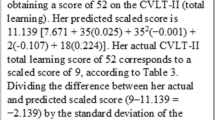Abstract
Neuropsychological impairment is common in MS but routine evaluation is cumbersome. Many proposed avenues to more cost effective evaluation of cognition in MS have appeared in the literature. In this article, we summarize work conducted at our center over the past five years involving two specific evaluation methods, the Multiple Sclerosis Neuropsychological Screening Questionnaire (MSNQ) designed to screen for neuropsychological impairment in MS and the Minimal Assessment of Cognitive Function in MS (MACFIMS) designed to quantify cognitive function with psychometric testing. Our research shows that these methods are reliable and valid. Data show strong relationships with neuropsychiatric features of the disease, brain imaging and vocational outcomes. Work with new non-conventional brain imaging techniques and finer analysis of reliability during serial testing protocols is underway.
Similar content being viewed by others
References
Beck AT (1993) Beck Depression Inventory. Psychological Corporation, San Antonio, TX
Benedict RHB (1997) Brief Visuospatial Memory Test – Revised: Professional Manual. Psychological Assessment Resources, Odessa, FL
Benedict RHB (2005) Effects of using same vs. alternate form memory tests during short-interval repeated assessments in multiple sclerosis. J Int Neuropsychol Soc 11:727–736
Benedict RHB, Bruce JM, Dwyer MG, Abdelrahman N, Hussein S, Weinstock-Guttman B, Garg N, Munschauer F, Zivadinov R (2006) Neocortical atrophy, third ventricular width, and cognitive dysfunction in multiple sclerosis. Arch Neurol 63:1301–1306
Benedict RHB, Carone D, Bakshi R (2004) Correlating brain atrophy with cognitive dysfunction,mood disturbances, and personality disorder in multiple sclerosis. J Neuroimaging 14:36S–45S
Gunther M, Munschauer F, Garg N, Weinstock-Guttman B (2006) Validity of the Minimal Assessment of Cognitive Function in Multiple Sclerosis (MACFIMS). J Int Neuropsychol Soc 12:549–558
Benedict RHB, Cox D, Thompson LL, Foley FW, Weinstock-Guttman B, Munschauer F (2004) Reliable screening for neuropsychological impairment in MS. Mult Scler 10:675–678
Benedict RHB, Bruce J, Dwyer MG, Weinstock-Guttman B, Tjoa C, Tavazzi E, Munschauer R, Zivadinov R (2005) Diffuse weighted imaging predicts cognitive impairment in multiple sclerosis. Mult Scler, in press
Benedict RHB, Fischer JS, Archibald CJ et al. (2002) Minimal neuropsychological assessment of MS patients: a consensus approach. Clin Neuropsychol 16:381–397
Benedict RHB, Munschauer FE, Linn R, Miller C, Foley FW, Jacobs LD (2003) Screening for multiple sclerosis cognitive impairment using a self-administered 15-item questionnaire. Mult Scler 9:95–101
Benedict RHB, Weinstock-Guttman B, Fishman I, Sharma J, Tjoa CW, Bakshi R (2004) Prediction of neuropsychological impairment in multiple sclerosis: comparison of conventional magnetic resonance imaging measures of atrophy and lesion burden. Arch Neurol 61:226–230
Benedict RHB, Zivadinov R (2006) Predicting neuropsychological abnormalities in multiple sclerosis. J Neurol Sci 245:67–72
Benedict RHB, Zivadinov R, Carone D, Weinstock-Guttman B, Gaines J, Maggiore C, Sharma J, Tommasi MA, Bakshi R (2005) Regional lobar atrophy predicts memory impairment in multiple sclerosis. Am J Neuroradiol 26:1824–1831
Benton AL, Sivan AB, Hamsher K, Varney NR, Spreen O (1994) Contributions to Neuropsychological Assessment, 2nd edn.Oxford University Press, New York
Carone DA, Benedict RHB, Munschauer FE, III, Fishman I, Weinstock-Guttman B (2005) Interpreting patient/ informant discrepancies of reported cognitive symptoms in MS. J Int Neuropsychol Soc 11:574–583
Christodoulou C, Krupp LB, Liang Z et al. (2003) Cognitive performance and MR markers of cerebral injury in cognitively impaired MS patients. Neurology 60:1793–1798
Costa PT, McCrae RR (1992) NEO PI-R Professional Manual. Psychological Assessment Resources, Odessa, FL
Cummings JL, Mega M, Gray K, Rosenberg- Thompson S, Carusi DA, Gornbein J (1994) The Neuropsychiatric Inventory: comprehensive assessment of psychopathology in dementia. Neurology 44:2308–2314
Delis DC, Kaplan E, Kramer JH (2001) Delis-Kaplan Executive Function System. San Antonio, TX: Psychological Corporation
Delis DC, Kramer JH, Kaplan E, Ober BA (2000) California Verbal Learning Test Manual, Adult Version, 2nd edn. Psychological Corporation, San Antonio, TX
Gronwall DM (1977) Paced auditory serial-addition task: a measure of recovery from concussion. Percept Mot Skills 44:367–373
Parmenter BA,Weinstock-Guttman B, Garg N, Munschauer F, Benedict RHB (2007) Screening for cognitive impairment in MS using the Symbol Digit Modalities Test. Mult Scler 13:52–57
Rao SM, Leo GJ, Bernardin L, Unverzagt F (1991) Cognitive dysfunction in multiple sclerosis. I. Frequency, patterns, and prediction. Neurology 41:685–691
Smith A (1982) Symbol digit modalities test: Manual.Western Psychological Services, Los Angeles, CA
Tjoa C, Dwyer M, Hussain M, Zivadinov R (2005) Brain segmentation inconsistency significantly impacts magnetization transfer measures. Mult Scler 11:S147
Zivadinov R, Dwyer M,Watts KL (2004) Measurement of cerebral grey and white matter atrophy from various MRI pulse sequences using different segmentation algorithms. J Neurol 251:S89–S89
Author information
Authors and Affiliations
Corresponding author
Additional information
An erratum to this article is available at http://dx.doi.org/10.1007/s00415-008-0901-z.
Rights and permissions
About this article
Cite this article
Benedict, R.H.B., Zivadinov, R. Reliability and validity of neuropsychological screening and assessment strategies in MS. J Neurol 254 (Suppl 2), II22–II25 (2007). https://doi.org/10.1007/s00415-007-2007-4
Issue Date:
DOI: https://doi.org/10.1007/s00415-007-2007-4



